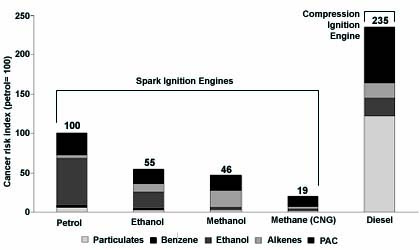May 4, 2000 How carcinogenic is your car? New Swedish study conducted for the Centre for Science and Environment states that scientists can even measure the cancer potency levels of the cars we ride. But think twice before you buy a diesel car over a petrol car. The new study has found cancer potency levels of diesel exhaust from Indian cars to be more than twice that from petrol. Meanwhile, a German government study finds diesel cars to be even worse. Centre for Science and Environment is alarmed by the results of the study conducted for it by the Swedish experts Peter Ahlvik and Ake Brandberg at Ecotraffic, Sweden. The experts have found that after taking into account all the toxic components in emissions the cancer potency level of diesel cars is double that of petrol cars in India. Even more frightening is the fact that if only particulate emissions are compared from different car models then the cancerous effect of diesel particulate matter from the new diesel car is equal to that of 24 new petrol cars and 81 compressed natural gas cars on roads.
The Swedish experts have identified traces of over 40 substances in diesel exhaust which have been listed by the USEPA as hazardous air pollutants and by the California Air Resources Board as toxic air contaminants. Unit risk of a chemical compound indicates the risk of developing cancer due to lifetime exposure to one microgramme per cubic meter of that compound. With the help of unit risk scientists can determine the cancer potency of each chemical substance in the exhaust separately. On the basis of the estimated cancer risk from different chemical compounds they have estimated the cancer index of the exhaust of different car models. Different countries have ascribed different values for cancer potency that is measured as unit risk Based on epidemiological studies. To make the task of comparison simpler, benzene- a known carcinogen – was taken as the standards carcinogenic compounds and cancer potency of all other compounds were estimated in comparison to benzene. To be able to calculate the effect during the vehicles lifetime several parameters such as climatic conditions, ageing of the engine and emission control systems, driving patterns and several others were taken into consideration and corrected keeping in mind the specific conditions in India. The results of the Swedish study are further supported by evidence from another study conducted by the German Federal Environment Agency. They have found diesel to be several dozen times more cancer causing than petrol. Diesel particles alone constitute as much as 95 per cent of the cancer causing potential of all diesel emissions, it reported. In 1997, the German Federal Environmental Agency had set up a Research Advisory Group for diesel engine emissions that studied the comparative risk from different emissions. German researchers found that the cancer potency of petrol emissions in Euro II, III, IV standards cars is at least 10 times lower than the comparable diesel engines. Diesel engine standards are not strong enough upto Euro IV levels. Only if the engine emission standards are made stricter then may be particulate filter technology will advance and become viable to lower the cancer potency levels to comparable levels. What further adds to the risk from diesel fumes is their ability to trigger and exacerbate a wide range of non cancerous effects including allergy, asthma, and other respiratory problems as well. A summery of scientific evidences prepared by Susannah Foster for the Boston Public Health Commission and Harvard Medical School, USA, clearly shows why diesel exhaust is such a serious cause of concern. Unfortunately, the evolving science of pollution has completely eluded Indian air quality regulators. They have failed to develop precise strategies to phase in cleaner fuels and technology by taking into account these health parameters of risk assessment. Only the Supreme Court ruling in Delhi directing all commercial vehicles – bus, taxis and autos to move to CNG addresses the issue. Compliance of this order is critical for reducing risk to public health. Official Cancer Registry Programme shows that one out of every 10-15 people living in Delhi is likely to get cancer in his or her life time.
For more information contact Air pollution
Control Unit in CSE. |
